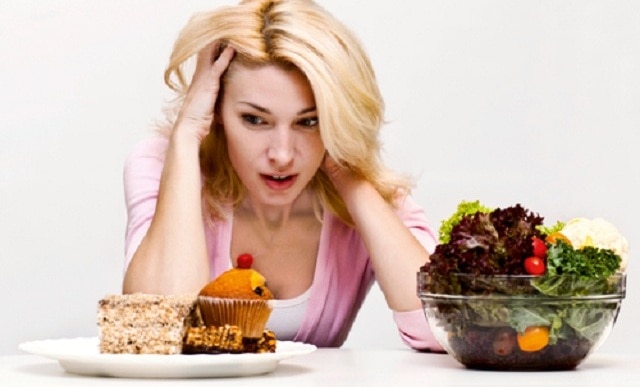Table of Contents
ToggleStress, Emotional Eating and Hormones
Stress can unleash hormones that cause cravings for sweet, sugary and high-fat foods. Stress is defined as a state of mental or emotional strain or tension resulting from adverse or demanding circumstances. This feeling tends to push people towards ‘comfort foods’. It is probably safe to say we have all stress eaten at least once! After a bad day who hasn’t gone to the cupboard and grabbed a sugary cake or biscuit? Something to indulge in to lift your mood a little, and it usually works! It gives you a temporary lift from the stressed, bad or down mood you were in. But why do we go for the treats to lift us and how does stress help us to pile on the kilos or struggle to get them off? It is all about Cortisol, Insulin and Leptin.
Cortisol
Cortisol is a glucocorticoid (steroid hormone) and is produced by the adrenal glands located on top of each kidney. Cortisol is the hormone secreted when your body is stressed. This stress could be from emotional sources, physical sources, training stress, dehydration, anxiety or sleep deprivation. Cortisol plays a key role in energy production by breaking down different types of tissue in the body to convert to glucose, which will give us more energy. Acute releases of cortisol can help us build muscle and burn fat. However, the issue becomes when we have chronically elevated cortisol.
When we have chronically elevated cortisol our body is preparing us for the ‘fight or flight response’. Our body thinks we are in a state of emergency and will sacrifice any tissue available to help give us energy if we need to fight or run, which includes muscle tissue. Chronically elevated cortisol can also lead to weight gain (1) as it fills the bloodstream with glucose (to give us energy) and then takes all the excess glucose that doesn’t get used and stores it as fat. Cortisol also has the power to mobilize triglycerides (fat) from storage and relocate them to visceral fat cells (those under the muscle, deep in the abdomen).
Stress influences us to satisfy the pleasure centres in our brains in an attempt to reduce stress. Cortisol can also work to increase appetite, to ensure there is enough energy for our body to deal with the stress. A study found women with high cortisol consumed more calories on days of higher stress, with the majority of these excess calories coming from sweet foods (2). So high levels of cortisol mean increased hunger and cravings for foods high in sugar and fat (2). Another study also showed that highly stressed women categorised by higher cortisol levels reported greater stress eating and greater abdominal fat than low-stress women (3).
Insulin
Insulin is secreted by the pancreas to regulate the levels of glucose in our blood. When we eat carbohydrates this spikes glucose in the bloodstream – because glucose is toxic in the bloodstream insulin is released to get the glucose out of the bloodstream and into the cells. Depending on how insulin-sensitive or resistant you are will depend on whether the excess glucose is taken to the muscle or fat cells.
When we are stressed the comfort foods we look to are carbohydrate foods with a high glycemic index (foods high in sugar and fat). These release a large amount of glucose into the blood within a short time. This means a lot of insulin has to be released to deal with all the glucose that has suddenly arrived in the bloodstream. The excess glucose is then taken to the fat cells for storage.
As we spoke about before, when we are stressed cortisol dumps glucose into the bloodstream for immediate energy use (fight or flight response). These high levels of blood glucose mean high levels of insulin. Because the types of stress we are generally under don’t need to be physically fought or run from the excess glucose is then stored as fat (generally around the hips and tummy). Eating a diet high in sugary and salty carbohydrates OR having chronically elevated cortisol; over time can lead to insulin resistance and type 2 diabetes.
Stress can be a very dangerous thing for the body if it has a regular presence in your life.
Leptin
When insulin levels are high it affects other hormones that have important roles in how much fat we store. One of these hormones is Leptin.
Leptin works together with insulin and is released from the fat cells to let our bodies know we are full. Leptin is a messenger hormone between the brain and our fat cells. Issues come about when this message becomes impaired – this is called leptin resistance. This means the fat cells cannot tell the brain that the body is full so the brain keeps telling the body to eat more (appetite increases).
Studies have shown that leptin may play a role in ‘stress eating’ when we are exposed to a stressful situation (4). Leptin can become impaired during states of stress and cause us to either lose our appetite or it can have us reaching for comfort food by increasing our appetite. However, up to 60% of people report eating more total calories when they are experiencing stress (4).
Leptin and insulin are hormonal counterparts. As in, when one is negatively affected the other will be also negatively affected. This means when we are stressed cortisol has us craving sugary and salty foods, leptin has us with an increased appetite so we can eat more sugary and salty foods, and insulin is ready to take the excess glucose from these foods straight to the fat cells around the hips and abdomen for storage. Providing a perfect hormonal environment for us to put on body fat.
Controlling your stress is the biggest factor in lowering your cortisol levels and preventing you from ‘stress eating’. It is important to do whatever you can to reduce stress in your life (especially if you are a regular stress eater). Meditation, relaxation, listening to music, walking and exercise are all excellent ways to lower stress and keep cortisol in check. Moreover, studies have indicated that exercise has antidepressant and anxiolytic effects and protects against the harmful consequences of stress (5). If you struggling with emotional eating and stress, and are unsure of how to get past it you can email me at mandy@localhost
References
- Epel ES, McEwen B, Seeman T, et al. Stress and body shape: Stress-induced cortisol secretion is consistently greater among women with central fat. Psychosom Med. 2000;62(5):623-632.
- Epel, E., Lapidus, R., McEwen, B., & Brownell, K. (2001). Stress may add bite to appetite in women: a laboratory study of stress-induced cortisol and eating behaviour. Psychoneuroendocrinology,26(1), 37-49
- Tomiyama, A. J., Dallman, M. F., & Epel, E. S. (2011). Comfort food is comforting to those most stressed: evidence of the chronic stress response network in high-stress women. Psychoneuroendocrinology,36(10), 1513-1519.
- Ulrich-Lai, Y. M., Fulton, S., Wilson, M., Petrovich, G., & Rinaman, L. (2015). Stress exposure, food intake and emotional state.Stress,18(4), 381-399.
- Salmon, Peter. “Effects of physical exercise on anxiety, depression, and sensitivity to stress: a unifying theory.” Clinical Psychology Review 21.1 (2001): 33-61.





